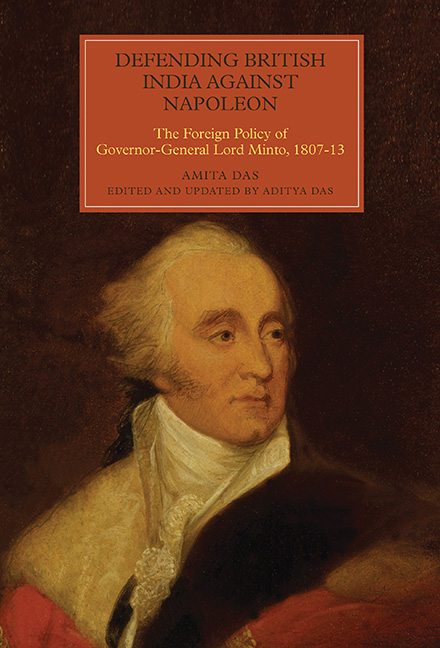Book contents
- Frontmatter
- Dedication
- Contents
- List of Illustrations
- Preface
- Abbreviations
- Chapter 1 Setting the Stage
- Chapter 2 Positioning in Persia
- Chapter 3 Creating a Buffer Zone
- Chapter 4 Protecting Trade and Supply Lines
- Chapter 5 Pre-empting French Influence in Java
- Chapter 6 Legacy of Lord Minto
- Appendix Government of the East India Company
- Bibliography
- Index
- Worlds of the East India Company
Appendix Government of the East India Company
Published online by Cambridge University Press: 11 May 2021
- Frontmatter
- Dedication
- Contents
- List of Illustrations
- Preface
- Abbreviations
- Chapter 1 Setting the Stage
- Chapter 2 Positioning in Persia
- Chapter 3 Creating a Buffer Zone
- Chapter 4 Protecting Trade and Supply Lines
- Chapter 5 Pre-empting French Influence in Java
- Chapter 6 Legacy of Lord Minto
- Appendix Government of the East India Company
- Bibliography
- Index
- Worlds of the East India Company
Summary
Court of Proprietors/Directors
Until 1784, the home government of the East India Company had consisted of the Proprietors of India Stock and twenty-four Directors. Any person who purchased shares in the capital stock of the East India Company was denominated a Proprietor and was permitted to attend the meetings of the Central Court of Proprietors. A purchase of £500 stock entitled the holder to vote ‘in a show of hands’; possession of £1,000, £3,000, £6,000 and more than £10,000 stock gave the Proprietor single, double, triple and quadruple votes respectively in a ballot. Four votes was the maximum possible. The Investors of the Company included the banking, shipping and commercial interests of the City of London and the returned Anglo-Indians or ‘Nabobs’ who acquired India Stock either as a convenient investment yielding an annual return of 8 per cent or as a means by which they could gain influence, a Directorship, power and patronage in the Company.
The meetings of the Proprietors were held quarterly (in March, June, September and December) but could be called at any time by the Directors or a quorum of nine of the Proprietors. Prior to 1784, the Court of Proprietors had the power to reverse the decisions of the Directors and on several occasions resulted in prolonged and bitter struggle and deadlock on critical issues, but Pitt's India Act of 1784 which created a Board of Control to manage the proceedings of India House, decreed that the Court of Proprietors could not veto a proposal made by the Directors and approved by the Board. This greatly weakened the power of the Proprietors, but in the period from 1784 to 1834 still represented an expression of public opinion on the response to the Company's government and policies both in India and Britain. The form of proceedings at these meetings was based on the House of Commons, but all important questions were referred for final decision to a ballot which usually took place a fortnight after the meeting.
The most important function of the Proprietors was to elect the twentyfour Directors who formed the executive body of the Company in Britain.
- Type
- Chapter
- Information
- Defending British India against NapoleonThe Foreign Policy of Governor-General Lord Minto, 1807-13, pp. 245 - 248Publisher: Boydell & BrewerPrint publication year: 2016

